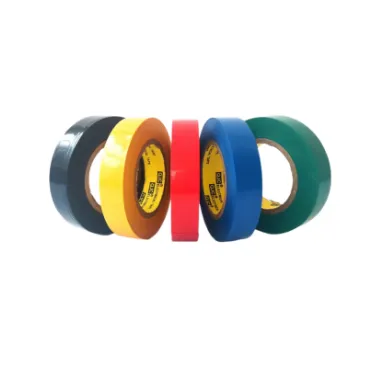In any electrical setup — from basic wiring to high-voltage industrial systems — insulation is critical. That’s why electrical tape is a must-have material for electricians, contractors, utility workers, and even DIYers. Used to insulate, protect, and organize wires, the right electrical tape ensures safety, prevents short circuits, and maintains system integrity under tough conditions.

While vinyl tape is the most common, rubber electrical tape plays a major role in high-performance and high-voltage applications. Whether you're sourcing products, comparing electrical tape price, or looking for reliable electrical tape manufacturers, this guide has everything you need to know.
What Is Electrical Tape?
Electrical tape is a pressure-sensitive adhesive tape used to insulate electrical conductors and protect against heat, moisture, and corrosion. It’s flexible, flame-retardant, and often color-coded for wiring identification.
Types of electrical tape by material:
PVC (Vinyl): Common for general-purpose use
Rubber: High-performance insulation, self-fusing
Cloth/fabric: Used in automotive or harness assembly
Silicone: High-temperature applications
Mastic: Sealant for moisture protection (used with other tapes)
Each type serves a different function, and using the wrong tape could lead to system failures or safety hazards.
Rubber Electrical Tape: Built for High-Stress Jobs
Rubber electrical tape is known for its high-voltage insulation, flexibility, and self-fusing properties. It bonds to itself (not to surfaces) under tension, creating a seamless, solid mass over time. This makes it ideal for splices, terminations, and cable joints.
Key features of rubber electrical tape:
Rated for medium- to high-voltage (up to 69kV+)
Moisture- and weather-resistant
Non-adhesive but self-amalgamating
Conforms to irregular shapes and cable bends
Durable in harsh environments: UV, ozone, and chemical exposure
Applications include:
Underground cable splicing
Outdoor terminations
Power distribution and substations
Motor and transformer connections
When layered correctly with mastic or vinyl outer tape, rubber tape forms a durable, waterproof seal that can last decades.
Leading Electrical Tape Manufacturers
For distributors, resellers, and procurement teams, partnering with trusted electrical tape manufacturers is essential for product consistency, safety, and certification compliance.
Questions to ask manufacturers:
What voltage ratings are your rubber tapes certified for?
Do you offer UL-listed or ASTM-tested products?
Can you support OEM labeling or custom packaging?
What is your MOQ and lead time?
Sourcing directly from electrical tape manufacturers reduces costs and ensures control over branding and quality.
Understanding Electrical Tape Price
Electrical tape price varies depending on material, size, certifications, and brand. Here’s a general pricing breakdown (retail and bulk):
|
Tape Type |
Retail Price (per roll) |
Bulk Price (per roll) |
|
PVC Vinyl Tape (3/4"x66ft) |
$0.80 – $2.50 |
$0.30 – $0.90 |
|
Rubber Electrical Tape |
$6 – $15 |
$2 – $5 |
|
Mastic Tape |
$4 – $12 |
$1.50 – $4 |
|
Silicone Insulation Tape |
$8 – $18 |
$3 – $7 |
What affects pricing:
Material quality (e.g., pure EPR vs. blended rubber)
Brand name vs. OEM
Certifications (UL, CSA, RoHS, ASTM)
Packaging (individual vs. bulk rolls)
Minimum Order Quantity (MOQ)
For businesses, the best value often comes from importing directly from a manufacturer or buying wholesale through distributors.
How to Choose the Right Tape
When evaluating options, consider the following:
Voltage rating: Is it safe for your system?
Environmental exposure: UV? Moisture? Chemicals?
Installation surface: Flat, curved, or irregular?
Application method: Adhesive vs. self-fusing
Certifications: UL 510, ASTM D4388, CSA 22.2
For example, use rubber tape for splices and terminations, and vinyl tape for labeling or low-voltage bundling.
Electrical Tape FAQs
Q1: What’s the difference between vinyl and rubber electrical tape?
A: Vinyl tape has adhesive and is used for bundling or low-voltage insulation. Rubber electrical tape is self-fusing and made for high-voltage insulation and sealing.
Q2: Can I use electrical tape outdoors?
A: Yes, but choose UV- and weather-resistant types like rubber or silicone tape. Always check environmental ratings.
Q3: Does rubber electrical tape have adhesive?
A: No. It’s self-amalgamating — it sticks to itself under tension, forming a solid mass for insulation and sealing.
Q4: Where can I get electrical tape at wholesale prices?
A: Direct from electrical tape manufacturers, industrial distributors, or on B2B platforms with OEM options.
Q5: How long does electrical tape last?
A: Vinyl tape can last 5–7 years, while properly applied rubber tape in protected conditions can last 20+ years.
Electrical tape is more than just a toolbox basic — it’s a critical part of system safety and performance. Whether you’re insulating low-voltage wiring or sealing high-voltage joints, using the right tape matters. Rubber electrical tape delivers unmatched protection where it counts, and working directly with electrical tape manufacturers ensures quality at scale.
-
XIANGFAN Rubber Tape-Ultimate Solutions for All Your Insulation NeedsსიახლეებიJun.24,2025
-
XIANGFAN Rubber Tape-Protection for Industrial and Residential ApplicationsსიახლეებიJun.24,2025
-
XIANGFAN Rubber Tape: Superior Safety and Sealing for Demanding EnvironmentsსიახლეებიJun.24,2025
-
XIANGFAN Rubber Tape: Reliable Solutions for Every Electrical ChallengeსიახლეებიJun.24,2025
-
XIANGFAN Electrical & Industrial Tape: Powering Reliability Across IndustriesსიახლეებიJun.24,2025
-
XIANGFAN Electrical & Industrial Tape: Excellence in Every ApplicationსიახლეებიJun.24,2025
